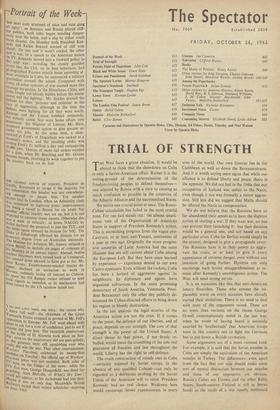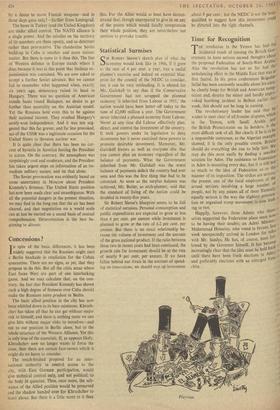TRIAL OF STRENGTH
HE West faces a grave situation. It would be T
absurd to think that the showdown on Cuba is only a Soviet-American affair. Rather it is the testing-ground of the determination of the freedom-loving peoples to defend themselves— one selected by Russia with a view to causing as much confusion as possible in the countries of the Atlantic Alliance and the uncommitted States.
We notice one crucial point at once. The Russo- Cuban calculation has failed in the most crucial zone. For one fact stands out: the almost unani- mous vote of the Organisation of American States in support of President Kennedy's action. This is astonishing progress from the vague pro- Castroist, or at least anti-Yanqui, sentiments of a year or two ago. Originally the more progres- sive countries of Latin America had the same illusions that are still current about Cuba among the European Left. But they have since learned by experience — experience denied to our own Castro-appeasers. Even without the rockets, Cuba has been a hotbed of aggression against -its neighbours. Its diplomats and agents have organised subversion. In the most promising democracy of South America, Venezuela, Presi- dent Betancourt only the other day publicly de- nounced the Cuban-directed efforts to bring down his regime in bloody destruction.
In the last analysis the legal niceties of the American action are not the crux. If it comes to the point, the defence of our liberties, and of peace, depends on our strength. The core of that strength is the power of the United States. A direct threat to that power, if not firmly re- buffed, would mean the crumbling of the sole real guarantee of freedom and law throughout the world. Liberty has the right to self-defence.
The crash construction of missile sites in Cuba —certainly manned by Soviet troops, in the absence of any qualified Cubans—can only be regarded as a deliberate probing by the Soviet Union of the American will to resist. President Kennedy had no real choice. Weakness here would encourage Soviet expansionism in every
area of the world. Our own frontier lies in the Caribbean as well as down the Bernauerstrasse. And it is worth saying once again that while our alliance is to defend liberty and peace, theirs is the opposite. We did not feel in the 1940s that our occupation of Iceland was unfair to the Nazis, even though it too was formally a minor aggres- sion. Still less did we suggest that Malta should be offered the Nazis in compensation.
We do not believe that the Russians have so far abandoned their senses as to have the slightest notion of starting a war. If they want war, no one can prevent their launching it : but their decision would be a general one, and not based on any particular crisis. Cuba (or Berlin) would simply be the pretext, designed to give a propaganda cover. The Russians have it in their power to aggra- vate the crisis, or at least to give it every appearance of extreme danger, even without any intention of going further. Hysteria can only encourage such Soviet misapprehensions as re- main after Kennedy's unambiguous action. The West will need strong nerves.
It is on occasions like this that anti-American lunacy flourishes. Those who assume the im- plausible worst on every occasion have already started their ululations. There is no need to deal with most of the arguments raised. These are no more than variants on the theme George Orwell contemptuously noted in the last war, when he wrote of having heard it seriously asserted by 'intellectuals' that American troops were in this country not to fight the Germans but to put down a British revolution.
Some arguments are of a more rational kind. For example, it is said that the Soviet missiles in Cuba are simply the equivalent of the American missiles in Turkey. The differences—even apart from the fact that our side should make some sort of mental distinction between our missiles and those of our opponents---are obvious. Russia's Cubas are Estonia and the other Baltic States. South-eastern Finland is still in Soviet hands as the result of a war openly motivated by a desire to move Finnish weapons—and in those days guns only!—further from Leningrad.
The bases in Turkey (and the United Kingdom) are under allied control. The NATO alliance is a single power. And the missiles on the territory of its members arc there openly, and so deterrent rather than provocative. The clandestine Soviet build-up in Cuba is another and more sinister matter. But there is more to it than this. The line of Western defence in Europe stands where it does because it was at this point that Stalinist ex- pansionism was contained. We are now asked to accept a further Soviet advance. But we cannot fail to remember what happened when, exactly six years ago, democracy raised its head in Hungary. There was no question of American missile bases round Budapest, no desire to go further than neutrality on the Austrian model. Yet the Russians held even this to be against their national interest. They crushed Hungary's newly-won independence. And it was not sug- gested that this far graver, and far less provoked, act of the USSR was a legitimate occasion for the United States to threaten nuclear war.
It is quite clear that there has been no cur- rent of hysteria in America forcing the President to action. On the contrary, the atmosphere was surprisingly cool and moderate, and the President has taken urgent steps on information of an im- mediate military nature, and on that alone.
The Soviet provocation was evidently based on some uncertainty in Moscow about President Kennedy's firmness. The United States position has now been made clear and unambiguous. With all the potential dangers in the present situation, we may find in the long run that the air has been cleared, and that negotiation on a world scale can at last be started on a sound basis of mutual comprehension. Determination is the best be- ginning to detente.















































 Previous page
Previous page